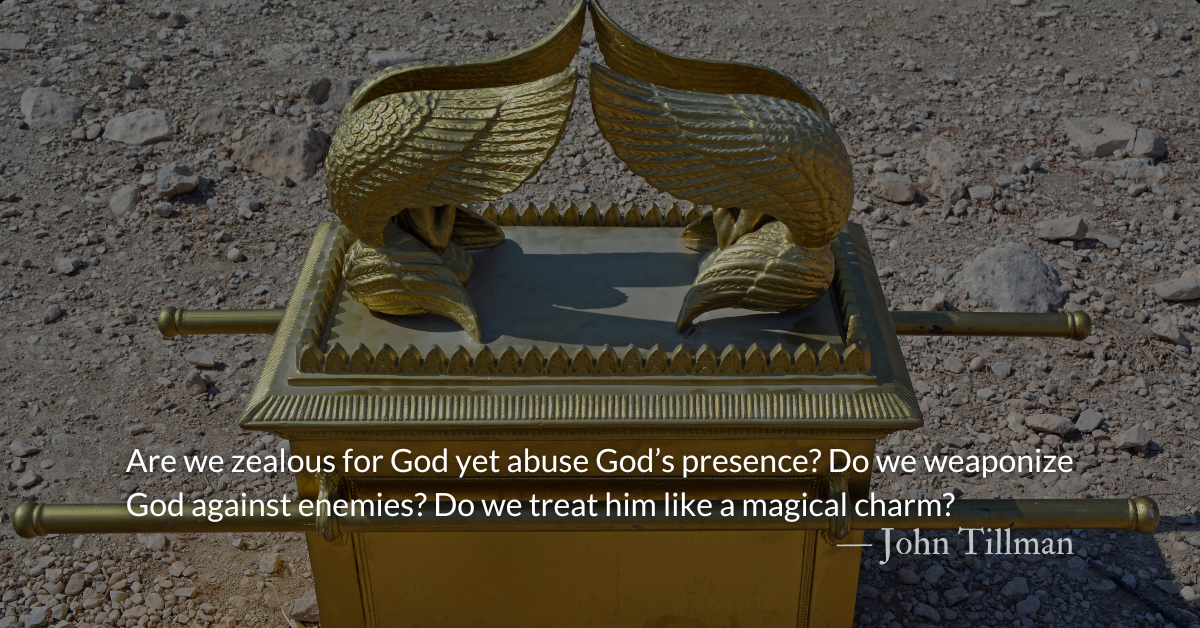Scripture Focus: 2 Samuel 6.2-11
2 He and all his men went to Baalah in Judah to bring up from there the ark of God, which is called by the Name, the name of the Lord Almighty, who is enthroned between the cherubim on the ark. 3 They set the ark of God on a new cart and brought it from the house of Abinadab, which was on the hill. Uzzah and Ahio, sons of Abinadab, were guiding the new cart 4 with the ark of God on it, and Ahio was walking in front of it. 5 David and all Israel were celebrating with all their might before the Lord, with castanets, harps, lyres, timbrels, sistrums and cymbals.
6 When they came to the threshing floor of Nakon, Uzzah reached out and took hold of the ark of God, because the oxen stumbled. 7 The Lord’s anger burned against Uzzah because of his irreverent act; therefore God struck him down, and he died there beside the ark of God.
8 Then David was angry because the LORD’s wrath had broken out against Uzzah, and to this day that place is called Perez Uzzah.
9 David was afraid of the Lord that day and said, “How can the ark of the Lord ever come to me?” 10 He was not willing to take the ark of the Lord to be with him in the City of David. Instead, he took it to the house of Obed-Edom the Gittite. 11 The ark of the Lord remained in the house of Obed-Edom the Gittite for three months, and the Lord blessed him and his entire household.
Reflection: Irreverently Abusing God’s Presence
By John Tillman
David and all Israel zealously celebrated…but they were zealously irreverent and Uzzah paid for it.
At first, it might seem like David and the Ark-keepers committed a minor infraction and Uzzah’s “irreverent act” was his well-intended steadying of the Ark. We need context.
For centuries, Israel properly cared for the Ark, the presence of God, and no one died. But, before Saul’s reign, Israel weaponized the Ark, taking it into battle where many Israelites died and the Philistines captured the Ark. (1 Samuel 4.3-11) The Ark, God’s presence, was a curse to the Philistines (1 Samuel 5.1-12), so they sent it away on a cart towed by animals. (1 Samuel 6.7-11) When the Ark returned, the Israelites disobeyed its regulations again, and more of them died. (1 Samuel 6.19-20) After that, the Ark was put under guard and rarely consulted. (1 Samuel 7.1-2; 1 Chronicles 13.3-4)
Scripture explicitly describes the Ark as God’s throne. It is “called by the Name,” meaning God’s name. Yet, David treated it just like the Philistines did—as a treasure or weapon to be transported by animals. Uzzah and David’s irreverent act was putting the Ark on the cart in the first place, not reaching out to steady it.
In fear, David leaves the Ark with Obed-Edom, the Gittite. The Gittites were one of the Philistine tribes from Gath—the same town and tribe Goliath was from. So David, using animals to carry the Ark as the Philistines did, returned it to Philistine care. But this time, its presence is a blessing. (After this, Obed-Edom’s sons were even included by David as gatekeepers at the Temple. 1 Chronicles 26.1, 4-8)
God’s presence no longer hovers between the Ark’s cherubim. His Holy Spirit is among believers. Jesus’ presence abides with “the least of these,” and how we treat them is how we treat him. (Matthew 25.40, 45)
Let us examine ourselves. Are we zealous for God yet irreverent of him? Do we abuse God’s presence? Do we take “the Name” in vain?
Do we weaponize God against enemies? Do we treat him like a magical charm? Or like a treasure we must hide and protect? How do we treat believers who are “called by the Name”? What about “foreigners” God blesses? How do we treat them? What “irreverent acts” like Uzzah’s do we commit against humans for whom Christ died?
May God have mercy on us, as he did on Obed-Edom, the faithful foreigner. It is better to be a gatekeeper in the house of God than dwell in wickedness. (Psalm 84.10)
Divine Hours Prayer: The Request for Presence
In the morning, Lord, in your might; we will sing and praise your power. — Psalm 21.14
– From The Divine Hours: Prayers for Summertime by Phyllis Tickle.
Today’s Readings
2 Samuel 6 (Listen 3:34)
Revelation 15 (Listen 1:29)
Read more about Undignified Weeping and Dancing
When we witness undignified worship, we would be wise to train our hearts to see and expect the best possible motives from others rather than the worst.
Read more about Supporting Our Work
Please consider becoming a donor. Support ad-free content that brings biblical devotionals to inboxes across the world.








